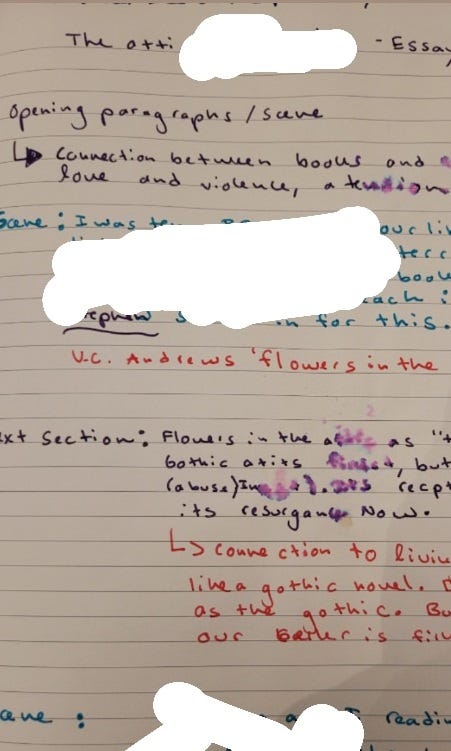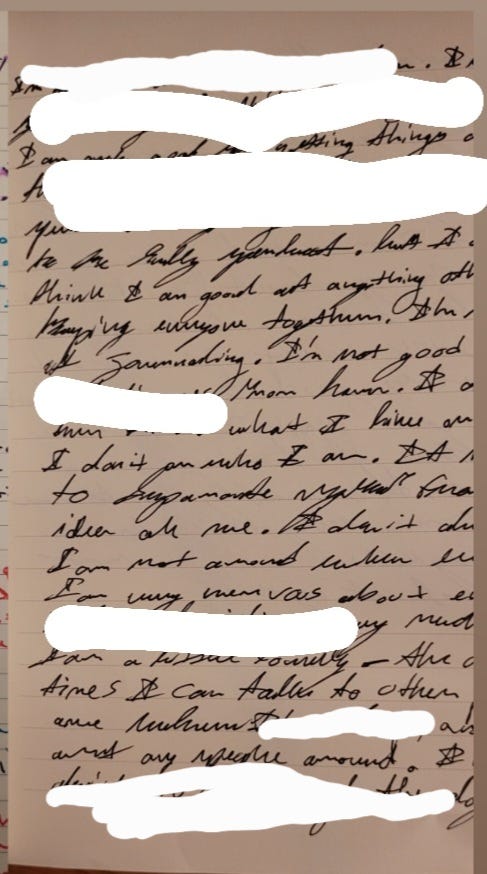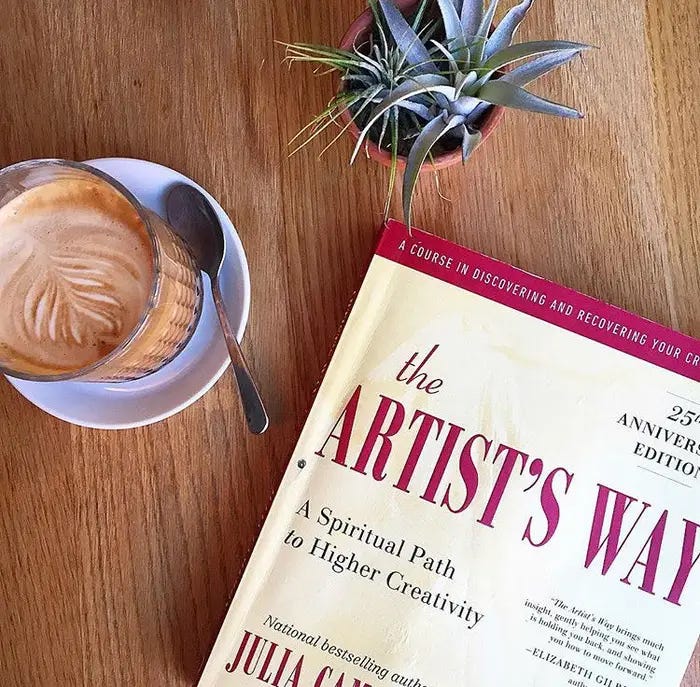Hell is real and it's a handwriting lesson
Iowa, accessibility, and the early 2000's cursive curse
If you know what Morning Pages are, you’ve likely been subjected a “Morning Pages Elitism” that is strangely disconnected from Julia Cameron’s original concept.
Writer’s have been utilizing Cameron’s writer’s-block-beating practice from The Artist’s Way for over a quarter of a century now, and yet, I’m often struck by how many of us have taken “write three pages worth of stream-of-consciousness without stopping, once per day” and added a handful of ways to discern if someone is “doing it correctly.”
“It isn’t morning pages if you don’t do it in the morning”
“It isn’t morning pages if you skip days or don’t write a full three pages”
“It isn’t morning pages if you don’t write out the pages by hand”
I’ve heard that last one a lot. It’s the same argument that a few of my university professors used to keep laptops out of their classes: handwriting is, somehow, better for thought processing, creativity, and memory.
I’m not a neuroscientist—I’m not going to pretend I can prove to you that handwriting is or isn’t better for your craft practice or your academic work. What I will say is that when we make hard and fast rulings on the physical requirements for having a writing practice, we’re making the assumption that every writer’s body and brain works exactly the same way.
I’ve had a strange relationship with handwriting for different reasons throughout my life.
I didn’t develop fine motor skills until I was well into my childhood, unable to hold a fork and knife or zip up my own coat until my peers were tying their shoes and neatly writing their names. By the time I learned to hold my pencil “correctly”, we were already learning cursive in class.
Exclusive cursive was mandatory while I was in grades three, four, and five at elementary school. We were taught cursive in the first month of third grade (I was in Grade 3 in 2004/2005), and had to handwrite all our assignments and tests “properly” until cursive writing was taken out of the Ontario school curriculum in Grade 6.
In Grade 6, every child in my class was expected to print out all of their work without cursive to make it “more readable”, but none of us had been allowed to print since Grade 1. The result? Most of the people I know who were born in 1996 and went to school in Southern Ontario have kind of messy, wildly unhinged, half-cursive, half-printed handwriting that hasn’t changed much since we were nine years old.
Despite my lack of fine motor skills, a lot of my old grades 3-5 work (journals, tests, and assignments kept in boxes at my mother’s house) appears to be written in nearly perfect cursive. I say appears because I have no memory of being good at cursive. At all. When I think back to writing in class back then, I get flashes of struggling through each loop and letter, still barely able to hold a pencil.
The first time I found my old assignments—home for reading week in my first year of university—I couldn’t believe that all that work in beautiful cursive was actually mine.
It wasn’t, in a way.
I didn’t think of it again until a few years later, in the Fall of 2017, when I started finding notes, lists, and journal entries written in the same handwriting, none of which I remembered writing.
There are a number of scientific articles that list different handwriting as a potential symptom for Dissociative Identity Disorder, but most of them were written following cases in criminal court in which DID was used as a defense. I’m not interested in using handwriting as a means through which to contribute to the “who’s faking and who’s not” narrative.
Different alters in a DID system might have different handwriting because they use the body differently. Holding a pencil differently; pressing firmer or lighter; only having memories up to a certain age of grammar or comprehension—all these things can change one’s handwriting. There will obviously be similarities between styles because the body doing the writing is the same.
My handwriting is very similar—if not exactly the same—about 90% of the time, regardless of which part of me is actually doing the writing. The other 10% is Stephen: the part of me who absorbed those years of cursive in a way that I did not.
Looking at writing like this is an odd experience for me. On one hand, I wrote it, because every part of me is me. On another, I feel removed from it.
This has sparked a question for me recently:
If handwriting is tied to a perception of who we are, by ourselves and by others, how does that impact our perception of those who can’t write by hand, and those whose handwriting doesn’t conform to White, English, Settler standards?
In February of 2022, I got a foot injury that a doctor incorrectly diagnosed as tendonitis. By July of this year, my foot had healed, but the shooting pain had acutely spread to both my wrists, leaving my mostly unable to type and hold objects, and completely unable to write by hand. I was temporarily put on a strong medication to bring down assumed inflammation in my wrists, which allowed me to type sporadically throughout my day. But I still can’t hold a pencil or pen tight enough to write by hand without pain. Morning Pages elitism is out of the question.
Does the classic All-American MFA in Creative Writing Program in its current iteration have room for the voice-to-text writers and the I don’t write every day writers and the writers who, by necessity or by choice, have taken handwriting sprints like morning pages out of their toolbox? I don’t think that it does. The larger issue is that places like the Iowa Writers Workshop historically don’t have room for most ways of being in the world that aren’t white, well-off, straight, cisgender, able-bodied authors writing European Canon inspired literary realism.
This doesn’t have to be the case forever, though. There are authors and professors out there rewriting the narrative of the The Writing Workshop, reshaping its structure and its intentions for those who have most often been shut out. Some of my favourite books (+ one essay) contributing to this work are below:
Craft in the Real World: Rethinking Fiction Writing and Workshopping, Matthew Salesses
Chinese Theories of Fiction: A Non-Western Narrative System, Ming Dong Gu
The Anti-Racist Writing Workshop: How to Decolonize the Creative Classroom, Felicia Rose Chavez
Body Work: The Radical Power of Personal Narrative, Melissa Febos
Elements of Indigenous Style: A Guide for Writing By and About Indigenous Peoples, Gregory Younging
“Being a writer was central to my identity. Then I was forced to write with my voice”, Gabrielle Drolet for The Globe and Mail
Like always, I don’t have the definitive answers to my own questions. But I’ll keep asking them. And add more questions. And invite you to ask questions with me. And all of us can inch towards answers in whatever way we know how.
As for my handwriting, I’m not itching to rush back into holding a pen anytime soon. Morning Voice Memos, anyone?
With Love,
Syd
Updates& Things
I’m teaching two March Break Youth workshops (ages 13-18) over Zoom for the Lighthouse Writer’s Workshop in 2023: Writing Through Climate Anxiety and Introduction to Short Fiction. Registration is here.
My poetry chapbook The Last Thing I Will See Before I Die is now available from 845 Press. You can purchase it here.
News: The Pump will be translated into French by Kama La Mackerel and published by Les éditions l'interligne. You can read more about that here.
News: Invisible Publishing has acquired North American rights to my next two books, Bird Suit (2024), and Bad Kids (2025, edited by Alicia Elliot). You can see my not-so-vague publishing tweet about that here.
I update my events and publishing things frequently on https://www.sydneyhegele.com/, so take a browse there if you’re ever wondering what I’m up to. And, of course, subscribe to Marsh Mail if you want more of these kinds of musings in your inbox.
Thanks for being you. Get out of here.









"Most of the people I know who were born in 1996 and went to school in Southern Ontario have kind of messy, wildly unhinged, half-cursive, half-printed handwriting"... that is a very apt description of my handwriting haha. You make so many great points about folks placing barriers around systems that were ultimately meant to help the writer, and nothing else - and therefore should be infinitely customizable and made always more accessible.
This made me think of an article by S.L. Huang on Tor.com about the history of the Iowa workshop model, SFF workshops, and the damage this model, when applied universally and with little moderation, can do to BIPOC writers and marginalized folks more broadly:
https://www.tor.com/2022/08/17/the-ghost-of-workshops-past-how-communism-conservatism-and-the-cold-war-still-mold-our-paths-into-sff-writing/